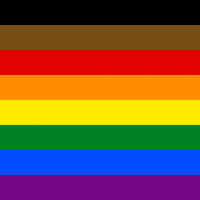讯息: 159
语言: English
sergejm (显示个人资料) 2019年12月31日上午5:17:17
But if the changes will be big, they will became not dialects, but languages.
Zam_franca (显示个人资料) 2019年12月31日上午9:34:12
sergejm:I think, Gender War gives to Esperanto less respect. More better if appear two dialects which use different fractions, komencantoj should elect, do he/she will accept changes.Well said.
But if the changes will be big, they will became not dialects, but languages.
Zam_franca (显示个人资料) 2019年12月31日上午9:40:54
Ploppsy32:You are wrong. Esperanto does not aim being perfect and if you believe this, it means that you have been misinformed.Zam_franca:the root "patr" is not working well. As culture has change language should change with it. We need to remember that language is fluid and there is nothing wrong with having an exception if it means modernizing the language and correcting old fashioned gender bias words. The creators of language Ido or Reformed Esperanto intentionally put in some exceptions to avoid this problem and it works fine and is less controversial. If Esperanto were to achieve gender symmetry I believe many more people would respect it and be willing to learn it. Words like these can be a complete turn off to people and may damage the chances of the language being accepted for international communication.Ploppsy32:Have those proposals surfaced as a solution to replace gender-biased ken words such as patro/patrino?Please read mi answer. Ĵusteno's system does not work, this is more a problem than a solution!your "parenco" system does not work, because there's already a root for that, and it's patr'. Esperanto is suitable almost only because of its regular grammar.
And that would be an exception!
Neduuma patro, neduum-patro, are working well. Esperanto does not need exceptions
Esperanto is a real language, spoken in events almost everyday on earth.
Learn to consider Esperanto as you are considering English, French or Danish, not as you are considering Ido.
Esperanto is also living out of the internet.
In fact, Ido is almost nothing out of the internet : it has only, at most, 5000 speakers.
Ploppsy32 (显示个人资料) 2019年12月31日下午11:57:24
sergejm:I think, Gender War gives to Esperanto less respect. More better if appear two dialects which use different fractions, komencantoj should elect, do he/she will accept changes.I like that idea.
But if the changes will be big, they will became not dialects, but languages.
Ploppsy32 (显示个人资料) 2020年1月1日上午12:08:14
讯息已经隐藏了。
Ploppsy32 (显示个人资料) 2020年1月1日上午12:09:40
讯息已经隐藏了。
Ploppsy32 (显示个人资料) 2020年1月1日上午12:10:51
I never said that Esperanto aims to be a perfect language. Since language is a reflection of culture and culture is a way people live life and people are imperfect there is no perfect language. However, the way people live life changes and the language should change as well.
"Esperanto is a real language, spoken in events almost everyday on earth."
Of course, I know Esperanto is a real language I have never doubted that.
"Learn to consider Esperanto as you are considering English, French or Danish, not as you are considering Ido."
I do not know what you mean by this.
Zam_franca (显示个人资料) 2020年1月1日上午11:45:18
"Learn to consider Esperanto as you are considering English, French or Danish, not as you are considering Ido."Esperanto is more like English than Ido.
However, the way people live life changes and the language should change as well.We don't change languages just like that, especially with such a new changement!
We don't create unuseful affixes to make a language gender-neutral or I don't know what.
Because a language has a cultural heritage. I don't want the modern Esperanto to become an "old Esperanto".
Esperanto needs stability.
The creators of language Ido or Reformed Esperanto intentionally put in some exceptions to avoid this problem and it works fine and is less controversial. If Esperanto were to achieve gender symmetry I believe many more people would respect it and be willing to learn it. Words like these can be a complete turn off to people and may damage the chances of the language being accepted for international communication.If you really think this, you are a reformist who does not specially like Esperanto, and who is simply trying to alterate the only arte-farita language which suceeded, as an opportunist would do.
Jxusteno (显示个人资料) 2020年1月1日下午8:09:35
Ploppsy32:Yes.Jxusteno:Have those proposals surfaced as a solution to replace gender-biased ken words such as patro/patrino?Ploppsy32:Do any of you all feel that words such as viro/virino, patro/patrino, frato/fratino, etc linguistically excludes women and nonbinary people just as the pronoun "li", in some peoples opinion, is linguistically exclusive?The English "nephew" and "niece" also are male and female respectively. For this reason, one has proposed the new gender-neutral word "nibling". Also there is a proposal to write "fiancé" instead of "fiancée"... In Esperanto one also has proposed a new gender-neutral words, e. g. "parento" for "parent". If you want to say "mother" in Esperanto, you can just add the female suffix -in-: "parentino" if you want to say "father" in Esperanto, you can add the unofficial male suffix -iĉ-: "parentiĉo"; if you want to say "non-binary parent" in Esperanto, you can add the unofficial non-binary suffix "-ip-": "parentipo".
In Esperanto and English the problem is easily solvable but eg Hebrew (especialy Old Hebrew) is very-very-very gendered language and at least now there isn't any gender-neutral third person pronoun in this language.
הוא is "he" and היא is "she".
And if someone is non-binary, They "shouldn't use Hebrew".
Zam_franca (显示个人资料) 2020年1月1日下午9:30:49
"shouldn't use Hebrew"Who are you quoting?

